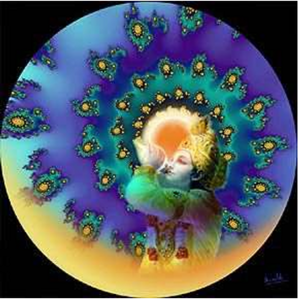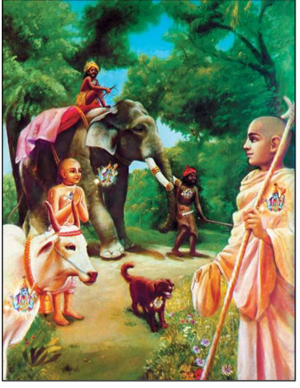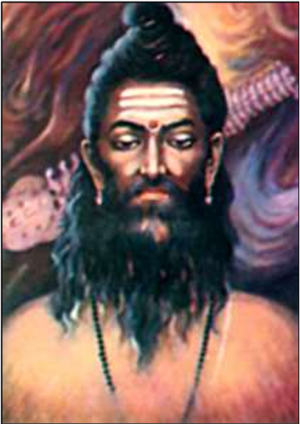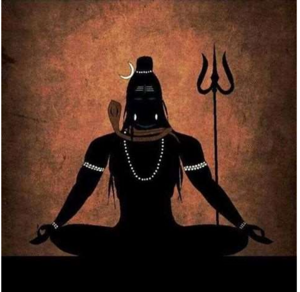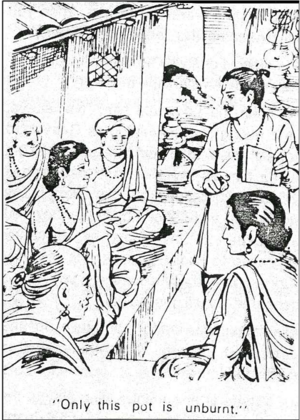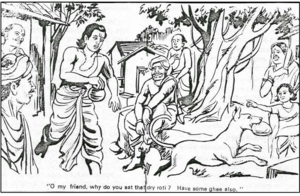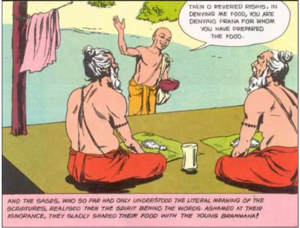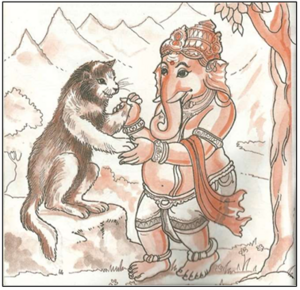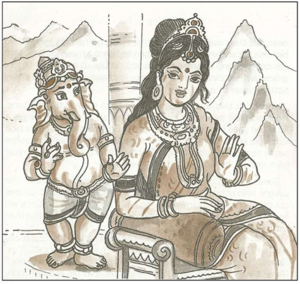Talk:Antaryāmī Bhāva: Indweller
By Vishal Agarwal
A variant of the Ātma Bhāva is the Antaryāmī Bhāva – or feeling always that Bhagavān is within oneself. In a general sense, the word ‘Antaryāmī’ means the Brahman Who is present inside everything as the inner controller. In a restricted sense, it means the Brahman that abides within our hearts as the inner controller as well as the witness. As the Supreme Īshvara pervades the entire creation, He controls it from within and makes the entire universe alive. He ensures that all the Cosmic Laws are obeyed the way he intends. Nothing is outside of His control even though we might not be able to see Īshvara over the entire creation. Although Omnipresent, he takes care of every individual and object in the creation as if he were a separate entity within each one of them.
O Īshvara, you are beyond the ocean of relative existence. You are also in the midst of it; I bow to you. You enable one to go beyond sin using holy chants. You take one beyond the cycle of births and deaths through knowledge, I bow to You.
You are present in the sacred flowing streams as well as on the coast, I bow to You. You are in the tender grass, on the sea shore as well as in the foaming waves – I bow to You. O Īshvara, You are on the sand banks as well as in the middle of the current – I bow to You. You are in the little pebbles as well as in the calm expanse of the ocean – I bow to You. O All-Pervading Īshvara, You are in the barren soil and the crowded places – I bow to You. Yajurveda, Mādhyandina Samhitā 16.42-43
The Devas made the human body their mortal home and dwelt within it. Atharva Veda (Shaunakīya) 11.8.18
He should not regard the Devas as residing far away from him. Because to the extent, he worships them as being close to him, to that very extent they are close to him. And he who says, “All these Devas are within me”, then truly in him exist all the Devas. Sāmaveda, Jaiminīya Upanishad Brāhmaṇa 1.14.1-2
He who dwells in the ātman, yet is within the ātman, whom the ātman does not know, whose body the ātman is, who controls the ātman from within – He is your Ātman, the inner controller, the immortal. Yajurveda, Brihadāraṇyaka Upanishad 3.7.22 Although One, You have penetrated diverse beings. Yajurveda, Taittiriya Aranyaka 3.14.3 He enters everyone and is their inner ruler. He is the ātman (inner pervade) of everything. Yajurveda, Taittirīya Āraṇyaka 3.11.1 He enters everything and is the inner doer (of all natural/cosmic processes). Yajurveda, Taittirīya Āraṇyaka 3.11.3
Salutations to the Deva who is in the fire, who is in the water, who has pervaded the whole universe, who is in the plants, and who is in the trees. Yajurveda, Shvetāshvatara Upanishad 2.17
The One Īshvara is hidden in all beings. He is all-pervading, and the Ātman (indwelling soul) of all. Yajurveda, Shvetāshvatara Upanishad 6.2
He is undivided (indivisible) and yet abides within beings as if divided; He is to be known as the sustainer of all beings; as well as their Devourer and Creator…Gita 13.16
There is only one ruler and no second ruler. He who is within the hearts of all creatures – Him alone I consider as the ruler. Just as water flows naturally whichever way the land slopes, likewise I do only those karm that the inner ruler inspires me to do. Anugita 11.1
Supreme Īshvara, you reside with the hearts of all creatures as the Witness. Agni Purāṇa 79.19
Meditate on the Ātman, the Īshvara, that abides within the heart like a lamp. Agni Purāṇa 165.1
Many religions teach about a God who controls the universe remotely from a place called heaven. People of these faiths look up towards that heaven while praying. Their prophets move up from earth to meet with God. Hindu traditions say that heavens exist but they are not the sole abode of the Divine, who exists everywhere and within us as well. Therefore, instead of seeking the Īshvara outside in some place called heaven, we should see It everywhere, including within us.
Krishna said to Arjuna: The wise see the same (Atman) in a Brahmana endowed with knowledge and humility, in a cow, in an elephant, and even in a dog or in an outcaste. Gita 5.18
As the All-Pervading Immanent Ātmā, Brahman is present not just within the good and virtuous humans, but also within the evil and the low, and also within non-human creatures. The Bhagavad Gita therefore emphasizes that the wise should see Brahman within everyone, and therefore treat everyone with respect and reverence:
Brahman’s presence in our hearts makes it possible for the human being to meditate on It and advance spiritually towards Moksha. This does not mean that Brahman is present only inside the heart of all creatures, or that It is not present in creatures which do not have a heart.! Krishna clarifies:
Krishna said to Arjuna: I am the Soul seated in the hearts of all creatures. I am the beginning, the middle, and the very end of beings. Gita 10.20
The reason why the heart is emphasized as an abode of Brahman in the human body and no other parts of the body as frequently is that it is very fruitful to meditate upon Brahman by focusing on the heart region. In the state of deep meditation, the individual soul abides in the heart (dahara-pundarīka) of its body. There, it is in very close communion with Brahman.
The presence of Brahman as Antaryāmī in the hearts of all creatures means that all living beings are the abode of the Divine and are worthy of our respect. He is impartial and presents equally to all. The scriptures state:
Krishna said to Arjuna: I am the same (Soul) in all. None is hateful or dear to Me. But those who worship Me with devotion, they are in Me and I am also in them. Gita 9.29
He who perceives the Supreme Īshvara as abiding alike in all beings, not perishing when they perish, he, truly sees. …Gita 13.27
Because perceiving the same Īshvara as established alike everywhere, he does not hurt the Ātman by the atman. Then, he attains the supreme goal. …Gita 13.28
None is dear to You, none inimical, none indifferent. These differences are only attributed to You by them whose vision is clouded by Māyā. Svayamprabhā in Adhyātma Rāmāyaṇa 4.6.71
Story: Rishi Pippalāda discovers that the Devas reside within his own Body
Rishi Dadhichi gave up his body so that his bones could be used by Indra to make Vajra, a strong weapon, for killing the evil Vritra. When the Rishi’s son, Pippalāda grew older, he was full of resentment about the fact that his father had to die for the sake of Indra. He blamed Indra and his Devatas for the death of his father, and all the suffering he had to undergo in his childhood due to the loss of his parent. He thought that the Devas were indeed selfish and depraved people because they had asked for his father’s bones to suit their selfish motives. He got nothing in return for his father’s supreme sacrifice.
Therefore, he decided to teach the Devatas a lesson. He meditated for a long to please Shiva, who finally appeared in front of him. Shiva offered him a boon. Pippalāda asked, “May the Devas burn to death!” Bhagavān Shiva asked him to choose another
, but the Rishi’s son would not agree. Therefore Shiva finally said, “So be it. Let the Devas start burning!”
But the moment He said this, Pippalāda started feeling a strong burning sensation in his own body, from head to toe. He cried to Shiva, “What have you done Bhagavān? I had asked you to burn the Devas but you are burning me instead!”
Bhagavān Shiva replied, “The Devas are not just outside of us. A portion of the Devas dwells inside all the creatures as well. Therefore, if you burn the Devas, you cannot escape their fate too. Your father was a great Rishi. No one forced him to die. All human beings have to die one day. But your father chose a very noble death, so that all the Devas and all the creatures may live. He made a great sacrifice for the sake of this creation. Do not belittle his sacrifice by bearing a grudge against the Devas.”
Pippalāda understood the greatness of his father through the words of Shiva, and he asked Bhagavān for forgiveness. He became a great Rishi and one of the compilers of the Atharvaveda, which is one of the four divinely revealed books of the Hindus[1].
Namadeva Learns the True Meaning of Bhakti (Devotion to Bhagavān)
One day, Sant Jnāneshvara and several other saints visited Pandharpur. They praised Namadeva for his saintly behavior. But, Jnāneshvara realized that for Namadeva, Bhagavān lived only in the Mūrti of the temple of Vitthala in Pandharpur. One day, Jnāneshvara called a potter named Gora and asked him, “You can find out with your stick whether a pot is baked or not. Can you also tap your stick on the heads of all the Bhaktas here and tell us who is a baked (experienced) Bhakta and who is unbaked (inexperienced)?” Gora did as told. And to everyone’s surprise, he said, “Namadeva seems to be an inexperienced Bhakta in this crowd.”
Now, Namadeva felt hurt. He rushed to the temple of Vithoba and demanded an explanation from Bhagavān. But, Bhagavān instead said to him in a dream, “Go to the Shiva Mandir of Mallikārjuna. There, you will find Visobā Khechara, who is a great Bhakta of Shiva. Accept him as your Guru, and he will teach you how to become a perfect Bhakta.”
When Namadeva reached the Shiva Mandir, he was shocked at what he saw. Visobā was sleeping inside the Mandir with his feet towards the Shivalinga, an insult to Bhagavān Shiva. Namadeva thought, “How can Vitthala ask me to become this foolish man’s student?” He woke up Visobā and said, “Do you realize that your feet are pointing towards the Shivalinga?” Visobā replied, “Yes, but I am old and too weak to move them. Please do me a favor. Move my feet in a direction away from the Shivalinga.”
But when Namadeva touched his feet, he saw a strange vision. He saw Shiva in all directions – in the walls, in the pillars, the ceiling the floor of the Mandir, and in all the other bhaktas gathered there. Namadeva got the message, which was that Bhagavān is present not just in the Mūrti, but everywhere.
When Namadeva understood the true meaning of bhakti, he became a ‘baked’ Bhakta. A transformation came in his behavior. Once, Namadeva was preparing his food when a dog suddenly grabbed his rotis and ran away. Namadeva saw Bhagavān in the dog too. He ran after the dog crying, “Wait, please do not run away with dry rotis. I will put some ghee on them for you.”
Love Bhagavān by Loving Everyone[2]
A young beggar once arrived at an āshrama where two Rishis were having their lunch. He said, “I must offer it to the Form of Divinity that we worship. Whom did you offer food to before eating it yourself?” They replied, “To the Vāyu Deva of course.” The beggar replied, “Do you realize that the same Vāyu Deva that flows within your nostrils also flows within that of every creature?” “Yes of course,” replied the Rishis. The beggar said, “Don’t you think then that by denying food to me, weaken my body, and deny food to the same Vāyu that flows within me and you?”
The Rishis pondered over what the beggar said. They understood that when we deprive someone else, we deprive the same Divine who is present within themselves and others. And when we show our love and compassion towards others, we do it to the Divine who is present equally within all of us. The Rishis felt ashamed of their ignorance and shared their food with the wise beggar.
Story: Ganesha learns a lesson from His Mother Pārvatī It was a bright sunny day on Kailash. Ganesha went out to play. He enjoyed looking at the butterflies and listening to the singing of birds. Suddenly, a cat walked to him. Ganesha was very pleased. He thought, “Let me become the cat’s teacher today.” So he held the two front paws of the cat and started dancing with it. After some time, Ganesha said, “Now I will release your paws. I want you to continue standing on your two legs and dance with me.” But as soon as he released the cat’s paws, it would sit down on all its four legs!
Ganesha tried to make the cat dance on its two legs on its many times. But the cat just could not do it. Now Ganesha became upset and said, “You are not being a good student. You will get some punishment for this.” In anger, he scratched the face of the cat. The cat got scared and ran away immediately.
It was lunchtime. Ganesha went back to his home and asked his mother Pārvatī, “Ma, is lunch ready? I am hungry.” Pārvatī replied, “Yes, food is ready, but let me put some bandage on my wounds first.” Ganesha grew worried. He rushed in and said, “Who scratched you so badly on your face?” Pārvatī replied, “It was you of course!” “You must be joking Ma! How is that possible? I was playing out all the time.
Someone else must have come in my place and pretended to be me. That person must have scratched your face.” Pārvatī replied, “My son Ganesha, try to remember if you scratched anyone today?” Ganesha became a little shy and said, “Yes, but it was a cat. What does the cat have to do with your scratches?” Pārvatī said, “My son, I am the Mother of the whole Universe. I live in every creature, whether it is a plant, an animal, or a human being. Therefore, whenever you hurt anyone else, you hurt me.”
Ganesha learned his lesson. He realized that if we love others, we love Bhagavān. And if we trouble others, we are hurting Bhagavān. So, he promised to his Mother, “I promise that from today onwards, I will never hurt others. I will never think bad about others. And I will never say bad things to others.”
Pārvatī smiled and said, “You are right my son. The best way to make Bhagavān happy is to love all creatures because Bhagavān lives inside everyone’s heart.”

